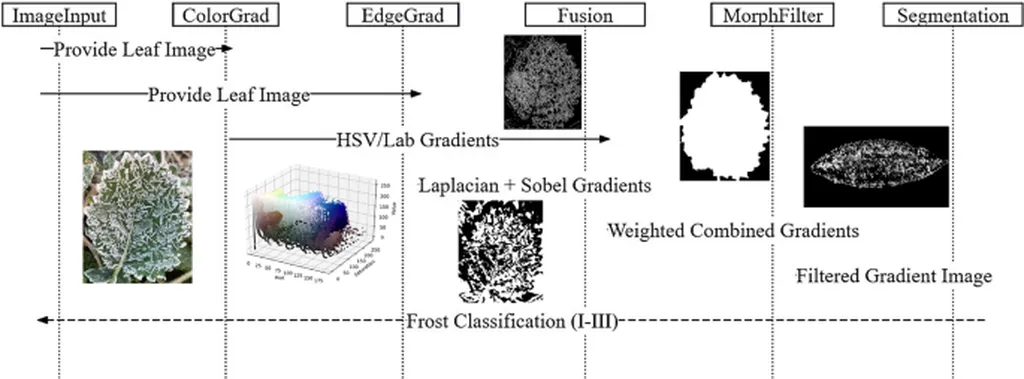In the realm of precision agriculture, where every degree and every pixel counts, a groundbreaking method for frost detection on leaf surfaces has emerged, promising to revolutionize how farmers monitor and protect their crops. Huan Song, a researcher from the School of Mechanical Engineering at North China University of Water Resources and Electric Power, has developed a novel algorithm called MCGE-Frost, which stands for Multi-Component Gradient Enhancement for Frost detection. This innovation addresses a critical challenge in agricultural monitoring: the accurate detection of frost on leaf surfaces, which is often hampered by complex backgrounds and subtle texture differences.
Frost damage can significantly impact crop yields, leading to substantial economic losses for farmers. Traditional methods of frost detection have struggled with segmentation errors, often confusing frost with soil, weeds, or other background elements. This is where MCGE-Frost shines. By integrating color space analysis with gradient fusion theory, the algorithm extracts gradient features from individual color channels, applies adaptive weighting to enhance frost-leaf boundary contrast, and employs morphological filtering to suppress background noise.
“The key innovation here is the multi-component gradient enhancement,” explains Huan Song. “By analyzing different color spaces and fusing their gradient features, we can significantly improve the accuracy of frost detection. This method not only reduces segmentation errors but also minimizes computational complexity, making it suitable for real-time monitoring.”
The results speak for themselves. In experiments conducted on leaf images, MCGE-Frost achieved a total algorithmic error segmentation rate of just 3.29%, significantly outperforming existing methods like ExG (8.63%), OTSU (8.98%), and HSV (11.98%). Moreover, the method reduces computational complexity by 40% compared to deep learning-based approaches, achieving a processing speed of 0.8 seconds per image on GPU-accelerated systems. This balance of accuracy and efficiency makes MCGE-Frost a game-changer for edge deployment in precision agriculture.
The implications for the agricultural sector are profound. Real-time frost monitoring can provide actionable insights for frost protection and crop management, ultimately leading to improved yields and reduced economic losses. As Huan Song notes, “This advancement supports the intelligence of frost quantification with minor manual calibration, making it a practical tool for farmers and agricultural technicians.”
Published in the prestigious journal *Scientific Reports* (translated from the original Chinese title), this research opens up new avenues for future developments in agricultural technology. The method’s robustness across diverse backgrounds and its ability to handle complex scenarios make it a versatile tool for various agricultural applications. As the world continues to grapple with the challenges of climate change and the need for sustainable agriculture, innovations like MCGE-Frost are crucial for ensuring food security and economic stability.
In the broader context, this research highlights the potential of integrating advanced computational techniques with agricultural practices. By leveraging the power of gradient enhancement and color space analysis, we can develop more accurate and efficient monitoring systems that support the intelligence of agricultural operations. As we look to the future, the continued collaboration between engineers, scientists, and farmers will be essential for driving innovation and addressing the pressing challenges of the agricultural sector.
In the words of Huan Song, “This is just the beginning. The potential for further advancements in this field is immense, and we are excited to explore new possibilities for improving agricultural monitoring and management.” With MCGE-Frost leading the way, the future of precision agriculture looks brighter and more promising than ever.

